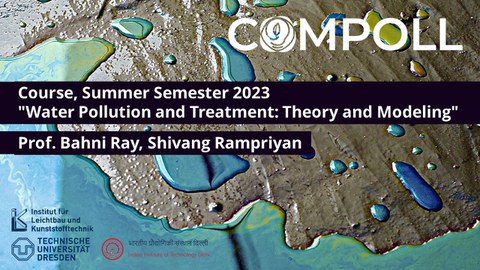COMPOLL Teaching, summer semester 2023 - "Water Pollution and Treatment: Theory and Modeling"
Download: PDF course description
COURSE PROGRAM AND CONTENT
The course is structured in three modules: Introduction to water pollution, wastewater treatment technologies, and modeling of membrane desalination techniques.
Each module will focus on the following content:
- Introduction to Water Pollution (WP): Precise definition of WP.
- Water pollutants and sources: Apportionment and scales of WP based on sources, discussion on wastewater (WW) and its generation.
- Impact of water pollution: degradation of various ecosystems and habitats.
- Measurement of impact: quantification through quality indices.
4.1 Discussion on popular water quality assessment indices for multiple thrust areas.
4.2 Case study on the calculation of different quality indices. - Addressing the challenges associated with produced WW (separate discussion on biological, organic, and inorganic WW).
- A general discussion on WW treatment (Pre-treatment, Primary treatment, Secondary treatment, Advanced treatment).
- Introduction to desalination.
- Mathematical modeling methods
8.1. Description of mass transfer as a physical phenomenon associated with WP (e.g., contaminant mixing, diffusion, leaching).
8.2. Advection-diffusion equation and its derivation.
8.3. Modeling of membrane desalination technologies
8.4. Modeling of deoiling technology
8.5. Modeling of degassing technology - Introduction to deoiling.
- Introduction to degassing.
- Special topic—Eliminating the generation of wastewater at source: Plausibility through prevention (technological, social, and behavioral interventions).
PREREQUISITES
Most parts of the course do not require any specialized technical knowledge. However, mathematical modeling will require a preliminary understanding of calculus, fluid flow, and heat/mass transfer. Therefore, senior undergraduates and students enrolled in advanced programs will be allowed to register for this course.
LEARNING OUTCOMES
On successfully completing this course, we expect the learners to be capable of:
- Defining and identifying water pollution and wastewater and their sources at multiple geospatial scales.
- Understanding and quantifying the impacts of pollution on available water resources.
- Listing technological, social, and behavioral prevention mechanisms for achieving robust source control of wastewater generation.
- Addressing the challenges posed by different types of wastewaters through comprehensive treatment methods.
- Appreciate the mathematical modeling of some popular treatment techniques.
METHODOLOGY
The course will run for 5 days. One take-home project in the form of a term paper will be given to extend the discussion occurring during the course lectures. The project will be evaluated via presentations and term paper submission.
SCHEDULE
| Content / Topics (refers to the first section) | ||
| Friday. June 9th, 2023 | 09:00-13:00 14:00-16:00 |
01., 02., 03., 4.1 8.1, 8.2, 4.2 |
|---|---|---|
| Saturday. June 10th, 2023 | 10:00-12:00 12:00-13:00 |
05., 06. 07., term paper tasks to be assigned |
| Saturday. June 24th, 2023 | 10:00-13:00 |
8.3, mid-course review for term paper |
| Friday. June 30th, 2023 | 09:00-13:00 14:00-16:00 |
09., 10., 8.4 8.5 |
| Saturday. July 1st, 2023 | 10:00-13:00 | 11., term paper final submission (online) + presentation |
Room
ILK, TU Dresden, Holbeinstraße 3, 01307 Dresden - DÜR 185/186
Course language
English
Scope: 2 SWS, 2 ECTS
.
COURSE INSTRUCTORS
Prof. Bahni Ray is from the Department of Mechanical Engineering in the Indian Institute of Technology Delhi. Her current research areas deal with: 1) 3-D printing, 2) exploring air and water pollution mitigation techniques, 3) investigating potential of compound parabolic collectors for solar cooling and 4) effective thermal protective clothing. Her work emphasizes on using modeling and analytical tools to understand the multiphase physics phenomena of solid and fluid which is the basis for all natural and industrial phenomena, before applying it to the field. She has taught both undergraduate and graduate level courses.
Shivang Rampriyan is a Prime Minister’s Research Fellow at the Department of Mechanical Engineering in the Indian Institute of Technology (IIT), Delhi. He graduated from IIT Delhi in 2020 with a Bachelor’s degree in Mechanical engineering. His research interests lie in the modeling, optimization, and design enhancements of membrane-based desalination systems using computational fluid dynamics, and electrokinetic modeling of solvent transport through membranes.

